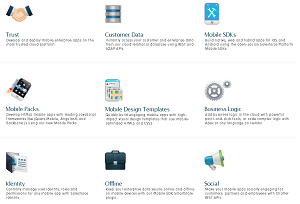News
New Back-End Services Anchor Salesforce App Cloud Mobile
- By David Ramel
- June 21, 2016
Salesforce.com Inc. today announced it has unified several of its mobile app development resources and combined them with new back-end services for a new initiative called Salesforce App Cloud Mobile.
For mobile developers, key components of the new offering are Salesforce's Lightning low-code (or no-code) app creation tools: App Builder and Component Framework. Last summer, the company unveiled the tools designed to help anyone -- not just developers -- create mobile apps for its CRM-based platform by using pre-built components assembled with a visual, drag-and-drop approach, along with the exchange where enterprises can shop for such apps.
The company said the rapid application development tooling helps enterprises overcome the "app gap" caused by a lack of skilled mobile developers, the most commonly cited challenge keeping organizations from meeting the tremendous demand for enterprise-oriented apps.
The new Salesforce App Cloud Mobile extends the company's existing App Cloud, referred to as a "one-stop shop for building, running, managing and optimizing apps." The App Cloud provides services such as Force.com, used with Lightning tools to rapidly crate and deploy cloud applications;
and Heroku, a cloud application platform that the company said lets developers create apps using programming languages such as Ruby, Node.js, Python and Java and instantly deploy them.
 [Click on image for larger view.]
Some of the Salesforce Platform Mobile Services (source: Salesforce)
[Click on image for larger view.]
Some of the Salesforce Platform Mobile Services (source: Salesforce)
"It brings together the platform services that our community of Salesforce Trailblazers love -- the no-code rapid app development capabilities of Lightning; the powerful clicks and code development services of Force and Heroku; the ability to bring the best of Salesforce, like Wave Analytics and Lightning Snap-ins, into any mobile app -- with new mobile back-end services for security, data integration and scalability that accelerate the development of any kind of business app," said company exec Brian Goldfarb in a blog post today.
Research firm Gartner Inc. just published a new report that put Salesforce among the "leaders" in the mobile app development platform (MADP) space.
Here's what Gartner had to say of Salesforce's wares. "Salesforce's App Cloud contains all the essential elements of a MADP to address a spectrum of mobile Web and app development needs, from line-of-business users to experienced developers," the report said. "Underpinning the newer capabilities of the multichannel App Cloud is a set of Lightning technologies consisting of a UI Component Framework, Schema Builder, Process Builder and App Builder. Lightning Schema Builder and Process Builder are used to build Web apps without coding, using a visual point-and-click approach, while App Builder offers a drag-and-drop editor to create and deploy hybrid apps via the Salesforce1 app container.
"For more custom-made app development, mobile SDKs for native iOS and Android, React Native framework and Cordova are available, as well as watchOS and Android Wear SDKs. Offline support has been available for apps built using the SDKs, but now Salesforce has added system-level offline support for objects and files for Salesforce1 and Lightning-built apps."
Goldfarb said App Cloud Mobile helps enterprise developers create and deploy apps twice as fast by handling back-end functionality commonly associated with Mobile Back-End-as-a-Service (MBaaS) systems. He said concerns such as security, data integration and scalability often impede the enterprise app building process, and listed the following ways the new offering addresses those concerns:
-
Security: Built-in identity and security features include user identity, two-factor authentication, encrypted offline database, and transaction security policies to ensure safe usage without impacting user experience.
- Data integration: Bring rich, contextual data to any mobile app from any data source like Oracle databases, SQL Server, SAP and so on -- whether it's using reference-based point and click integration patterns to your existing enterprise systems or streaming event data from connected devices at scale -- all with unified, consistent REST APIs.
- Scalability: App Cloud Mobile offers massive scalability based on elastic and multi-tenant infrastructure. With a few clicks, IT teams can now deploy mobile apps to thousands of employees and millions of consumers across the globe.
Goldfarb said enterprise customers such as consumer goods company Unilever and financial firm Barclays have already been using the Salesforce mobile tools.
"App Cloud Mobile is a key part of our vision for a digital employee," the company quoted Unilever exec Tom Madden as saying. "It is our strategic platform for delivering mobile apps to a staff of 100,000+ globally."
About the Author
David Ramel is an editor and writer at Converge 360.